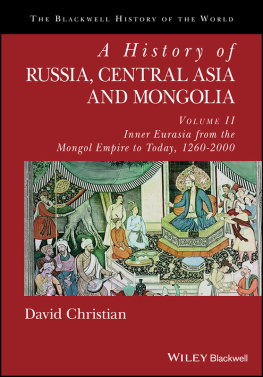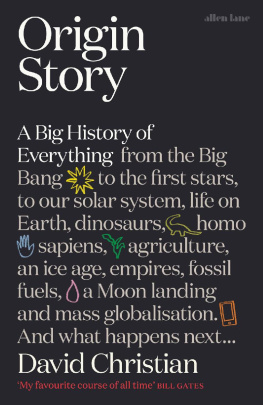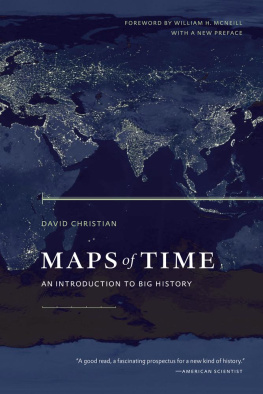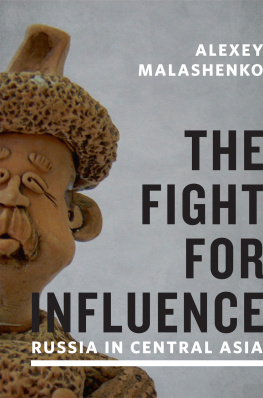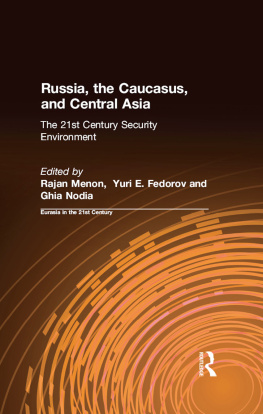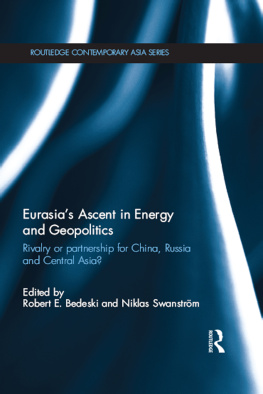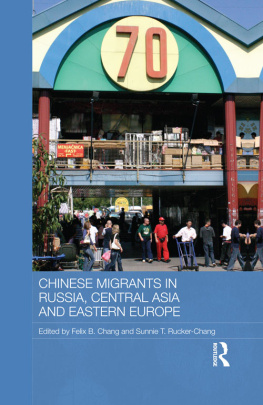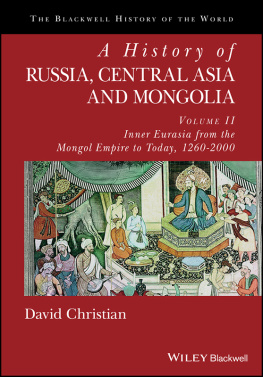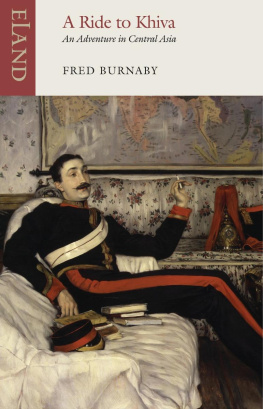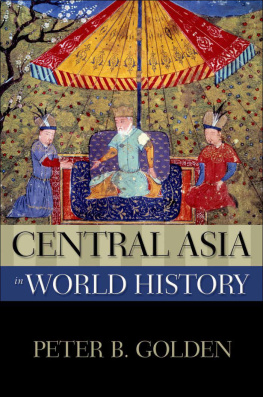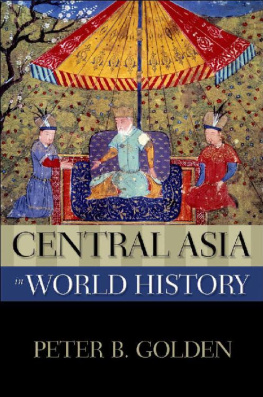David Christian - A History of Russia, Central Asia and Mongolia, Volume II
Here you can read online David Christian - A History of Russia, Central Asia and Mongolia, Volume II full text of the book (entire story) in english for free. Download pdf and epub, get meaning, cover and reviews about this ebook. year: 2018, genre: Romance novel. Description of the work, (preface) as well as reviews are available. Best literature library LitArk.com created for fans of good reading and offers a wide selection of genres:
Romance novel
Science fiction
Adventure
Detective
Science
History
Home and family
Prose
Art
Politics
Computer
Non-fiction
Religion
Business
Children
Humor
Choose a favorite category and find really read worthwhile books. Enjoy immersion in the world of imagination, feel the emotions of the characters or learn something new for yourself, make an fascinating discovery.
- Book:A History of Russia, Central Asia and Mongolia, Volume II
- Author:
- Genre:
- Year:2018
- Rating:4 / 5
- Favourites:Add to favourites
- Your mark:
- 80
- 1
- 2
- 3
- 4
- 5
A History of Russia, Central Asia and Mongolia, Volume II: summary, description and annotation
We offer to read an annotation, description, summary or preface (depends on what the author of the book "A History of Russia, Central Asia and Mongolia, Volume II" wrote himself). If you haven't found the necessary information about the book — write in the comments, we will try to find it.
A History of Russia, Central Asia and Mongolia, Volume II — read online for free the complete book (whole text) full work
Below is the text of the book, divided by pages. System saving the place of the last page read, allows you to conveniently read the book "A History of Russia, Central Asia and Mongolia, Volume II" online for free, without having to search again every time where you left off. Put a bookmark, and you can go to the page where you finished reading at any time.
Font size:
Interval:
Bookmark:

General Editor:R.I. Moore
A History of Latin America Available in third edition as A History of Latin America to 1825
Peter Bakewell
The Birth of the Modern World
C. A. Bayly
The Origins of Human Society
Peter Bogucki
A History of Russia, Central Asia and Mongolia: Volume I
David Christian
A History of Australia, New Zealand and the Pacific
Donald Denoon, Philippa Mein-Smith and Marivic Wyndham
A History of South-East Asia
Anthony Reid
A History of China
Morris Rossabi
The Western Mediterranean and the World
Teofilo F. Ruiz
A History of India
Second Edition
Burton Stein
A History of Japan
Second Edition
Conrad Totman
This edition first published 2018
2018 David Christian
All rights reserved. No part of this publication may be reproduced, stored in a retrieval system, or transmitted, in any form or by any means, electronic, mechanical, photocopying, recording or otherwise, except as permitted by law. Advice on how to obtain permission to reuse material from this title is available at http://www.wiley.com/go/permissions.
The right of David Christian to be identified as the author of this work has been asserted in accordance with law.
Registered Office
John Wiley & Sons, Inc., 111 River Street, Hoboken, NJ 07030, USA
John Wiley & Sons Ltd, The Atrium, Southern Gate, Chichester, West Sussex, PO19 8SQ, UK
Editorial Office
350 Main Street, Malden, MA 02148-5020, USA
For details of our global editorial offices, customer services, and more information about Wiley products visit us at www.wiley.com.
Wiley also publishes its books in a variety of electronic formats and by print-on-demand. Some content that appears in standard print versions of this book may not be available in other formats.
Limit of Liability/Disclaimer of Warranty
While the publisher and authors have used their best efforts in preparing this work, they make no representations or warranties with respect to the accuracy or completeness of the contents of this work and specifically disclaim all warranties, including without limitation any implied warranties of merchantability or fitness for a particular purpose. No warranty may be created or extended by sales representatives, written sales materials or promotional statements for this work. The fact that an organization, website, or product is referred to in this work as a citation and/or potential source of further information does not mean that the publisher and authors endorse the information or services the organization, website, or product may provide or recommendations it may make. This work is sold with the understanding that the publisher is not engaged in rendering professional services. The advice and strategies contained herein may not be suitable for your situation. You should consult with a specialist where appropriate. Further, readers should be aware that websites listed in this work may have changed or disappeared between when this work was written and when it is read. Neither the publisher nor authors shall be liable for any loss of profit or any other commercial damages, including but not limited to special, incidental, consequential, or other damages.
Library of Congress Cataloging-in-Publication Data
Christian, David, 1946
A history of Russia, Central Asia and Mongolia / David Christian.
p. cm. (Blackwell History of the world)
Includes bibliographical references and index.
Contents: v. 1. Inner Eurasia from prehistory to the Mongol Empire
ISBN 978-0-631-18321-1 (hbk : alk. paper). ISBN 978-0-631-20814-3 (pbk : alk. paper)
v. 2. Inner Eurasia from the Mongol Empire to Today, 1260-2000
ISBN 978-0-631-21038-2 (hbk : alk. paper). ISBN 978-0-631-21039-9 (pbk : alk. paper)
1. Former Soviet republicsHistory. 2. MongoliaHistory. 3. Sinkiang Uighur
Autonomous Region (China)History I. Title. II. Series.
DK40 .C49 1998
950dc21
983677
Cover image: Heritage Image Partnership Ltd / Alamy Stock Photo
Cover design by Wiley
There is nothing new in the attempt to grasp history as a whole. To understand how humanity began and how it has come to its present condition is one of the oldest and most universal of human needs, expressed in the religious and philosophical systems of every civilization. But only in the last few decades has it begun to appear both necessary and possible to meet that need by means of a rational and systematic appraisal of current historical knowledge. Until the middle of the nineteenth century history itself was generally treated as a subordinate branch of other fields of thought and learning of literature, rhetoric, law, philosophy, or religion. When historians began at that time to establish its independence as a field of scholarship in its own right, with its own subject matter and its own rules and methods, they made it in practice not the attempt to achieve a comprehensive account of the human past, but the history of western Europe and of the societies created by European expansion and colonization. In laying the scholarly foundations of their discipline they also reinforced the Enlightenment's belief in the advance of civilization (and, more recently, of western civilization), and made it in this form, with relatively minor regional variations, the basis of the teaching of history almost everywhere for most of the twentieth century. Research and teaching of the histories of other parts of the world developed mainly in the context of area studies like those of ancient Greece and Rome, rooted in philology, and conducted through the exposition of the canonical texts of their respective languages.
While those approaches prevailed world history as such remained largely the province of thinkers and writers principally interested in constructing theoretical or metaphysical systems. Only towards the end of the twentieth century did the community of academic historians begin to recognize it as a proper and even urgent field for the application of their particular knowledge and skills. The inadequacy of the traditional parameters of the discipline is now widely acknowledged, and the sense is growing that a world facing a common future of headlong and potentially catastrophic transformation needs its common history. The realization of such a history has been delayed, however, by simple ignorance on the one hand for the history of enormous stretches of space and time has until very recently been known not at all, or so patchily and superficially as not to be worth revisiting and on the other by the lack of a widely acceptable basis upon which to organize and discuss what is nevertheless the enormous and enormously diverse knowledge that we have.
The first of those obstacles is now being rapidly overcome. There is almost no part of the world or period of its history that is not the object of energetic and sophisticated investigation by archaeologists and historians. The expansion of the horizons of academic history since the 1980s has been dramatic. The quality and quantity of historical research and writing have risen exponentially in each decade, and the advances have been most spectacular in some of the areas previously most neglected. The academics have not failed to share the results of their labors. Reliable and accessible, often brilliant, accounts are now readily available of regions, periods, and topics that even 20 years ago were obscure to everyone but a handful of specialists. In particular, collaborative publication, in the form of volumes or sets of volumes in which teams of authors set forth, in more or less detail, their expert and up-to-date conclusions in the field of their research, has been a natural and necessary response to the growth of knowledge. Only in that way can non-specialists, at any level, be kept even approximately in touch with the constantly accelerating accumulation of information about the past.
Next pageFont size:
Interval:
Bookmark:
Similar books «A History of Russia, Central Asia and Mongolia, Volume II»
Look at similar books to A History of Russia, Central Asia and Mongolia, Volume II. We have selected literature similar in name and meaning in the hope of providing readers with more options to find new, interesting, not yet read works.
Discussion, reviews of the book A History of Russia, Central Asia and Mongolia, Volume II and just readers' own opinions. Leave your comments, write what you think about the work, its meaning or the main characters. Specify what exactly you liked and what you didn't like, and why you think so.

